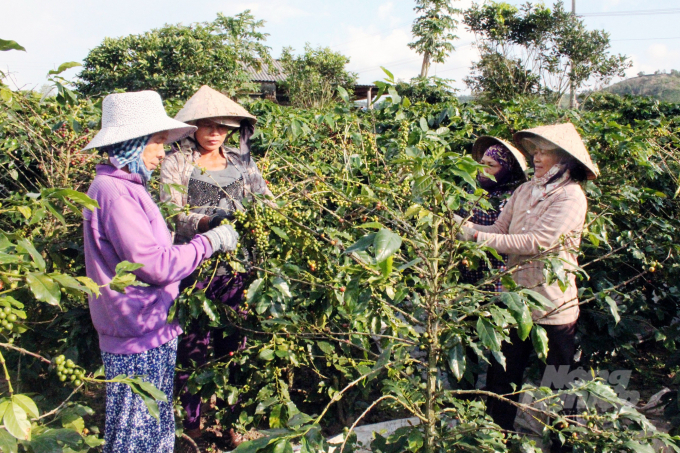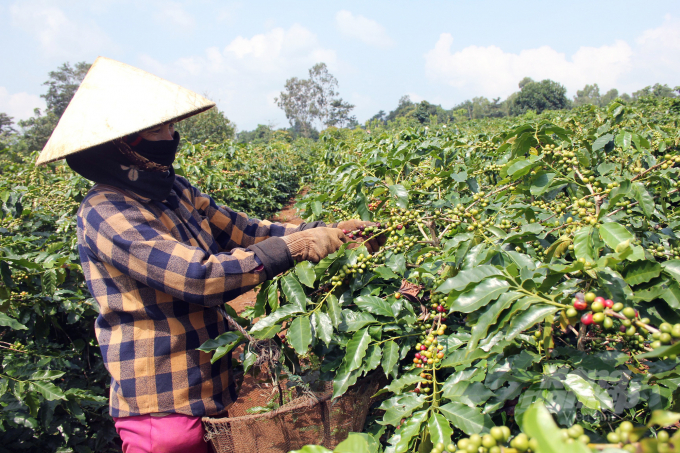November 27, 2025 | 17:44 GMT +7
November 27, 2025 | 17:44 GMT +7
Hotline: 0913.378.918
November 27, 2025 | 17:44 GMT +7
Hotline: 0913.378.918
Among more than 8,000 coffee growing households in Quang Tri, more than half are ethnic minorities. Up to 53 per cent of the total coffee growing area now see old, degraded trees or those infected with pests and diseases, which resulted in reduced yield.
Therefore, the replanting of coffee trees is very important in improving the living standards of the coffee growers.

Coffee trees are the main source of income for more than 8,000 households, with more than 50 per cent being ethnic minorities in Quang Tri. Photo: Vo Dung.
Tran Thuan, a coffee farmer in Dai Do village, Huong Phung Commune, Huong Hoa District said that he had been growing coffee for decades. Due to fluctuating prices, in recent years, he cut down coffee and switched to other crops, he said.
“Coffee prices have gone up and down erratically and falling for nearly ten years. Not only me, but many households here have switched to growing other crops for higher economic efficiency. Many coffee gardens are neglected. Now, it is very difficult to introduce new crops to the local people. Therefore, in addition to replanting coffee trees, increasing productivity and output, there must be a plan for how farmers can make a profit," Thuan said.
Ha Ngoc Duong, Vice Chairman of Huong Phung Commune People's Committee, said that the whole commune currently had over 2,400 ha of coffee, but up to 950 ha generated low productivity, an average of less than five tonnes of fresh coffee per ha.With the current coffee price, each hectare of coffee only brings people about VND45-55 million per year, sometimes even VND30-40 million per ha, excluding costs.
Therefore, many households were not interested in this crop. However, the price of coffee is increasing, the replanting of coffee trees here is showing signs of improvement.
“Prices are inching along with the province's policies to replant trees, which will create an incentive to help households return to coffee. Anyway, coffee is still the most suitable crop for the climate and soil conditions of the land of Huong Phung and the farming practices of the people," said Duong.
According to statistics, Quang Tri Province currently has over 4,000 ha of coffee, of which nearly 3,900 ha are for business.
The average yield is currently just over 1 tonne per ha. Through a survey of the agricultural department in the province, there was a time that over 53 per cent of the province's coffee area was old, degraded, infected with pests and diseases, and had productivity reduced.
Faced with that situation, in 2017, Quang Tri Provincial People's Committee implemented the project of replanting and sustainable development of coffee in the period of 2017 - 2020, up to 2025.
From 2017 to 2025, the provinces will replant 1,910 ha of coffee, focusing on 10 key coffee growing communes and towns in Huong Hoa district.
In addition to the coffee variety that farmers have long been cultivating, Arabica, Quang Tri's agricultural industry tested and selected two varieties of coffee - THA1 and TN9 to meet production conditions in the area and grew two seeding farms of the leading coffee line of Catimor, which meets the standards for seed sowing with an area of two ha to prepare seed sources for re-cultivation.
Through the actual inspection and initial assessment, most of the replanted coffee gardens have developed well. The garden replanted by new planting method from 2017 to 2019 has harvested, generating a yield of 15 tonnes of fresh fruit per ha, 1.2 - 1.5 times higher than the old coffee gardens. The garden replanted by cutting method saw a yield of 18-20 tonnes per ha, reaching 120 per cent of the project's target.
The province wants to develop organic agricultural production associated with key products, including Khe Sanh Arabica coffee. In the next few years, the locality will maintain and stabilise 5,300 -5,500 ha of coffee, with a minimum yield of 1.4 tonnes per ha.
By 2030, the province expects to complete the coffee replanting with 150 ha of coffee bing certified to meet organic farming and maintain and develop 60 ha of specialty coffee in Huong Phung Commune, Huong Hoa District.
Implementing the coffee replanting project, Quang Tri also established a number of coffee production groups and cooperatives that are linked in a sustainable way such as clean coffee, organic coffee, organic coffee, and organic coffee.
This has contributed to improving the quality of the province's coffee industry.

Coffee replanting in Quang Tri Province has not met expectation in recent years. Photo: Vo Dung.
However, by the end of 2021, the area for newly planted and replanted coffee trees in the province is only over 500 ha, accounting for only 26 per cent of the plan for the period 2017-2025. Many coffee areas are old, requiring large resources for replanting, but investment from the people is very limited.
Tran Can, Director of the Agricultural Extension Centre of Quang Tri province, said that in 2022, the locality would continue to implement the project of replanting coffee trees with an area of 105 hectares. Of which, 90 ha are re-cultivated by cutting method and 15 ha are re-cultivated by planting new trees.
Replanting coffee in Huong Hoa District
In 2022, Quang Tri Agricultural Extension Centre has extended a project to replant coffee on a total area of 12 ha in Huong Hoa District with the participation of 20 households. Under the project signed between the National Agricultural Extension Centre and the Quang Tri Agricultural Extension Centre, participating households are given materials include coffee seeds and pesticides. The Catimor coffee seeds are from two leading breeding orchards in the locality.
Translated by Hien Anh

(VAN) According to Mr. Vo Minh Thanh, Director of the Tay Ninh Department of Agriculture and Environment, Resolution 57 has created a new development pathway for the locality, shifting from traditional toward modern agriculture.
/2025/11/26/4909-2-154329_878.jpg)
(VAN) Pearl grouper farming in HDPE cages not only delivers economic efficiency but also contributes to protecting the environment, creating jobs, and promoting marine-based experiential tourism.

(VAN) The model of making a living under the forest canopy through the agroforestry system in Van Son commune, Bac Ninh province, is expected to generate an annual income of approximately VND 30 million/ha.

(VAN) Many enterprises in Can Tho are harnessing natural energy and reducing greenhouse gas emissions in their production processes, thereby contributing to the promotion of a sustainable green transition.
/2025/11/24/3536-2-112800_176.jpg)
(VAN) Dong Nai now has tens of thousands of hectares of forests certified for sustainable management, and this area will continue to be expanded in the coming period.

(VAN) Vinh Ha hamlet (Dai Xuyen commune, Hanoi) is shifting away from small-scale farming as households adopt bioscurity into their breeder chicken models.

(VAN) Heavy rains make aquatic species more vulnerable to disease. Proactive water management and high-tech systems help farmers prevent outbreaks and protect yields.